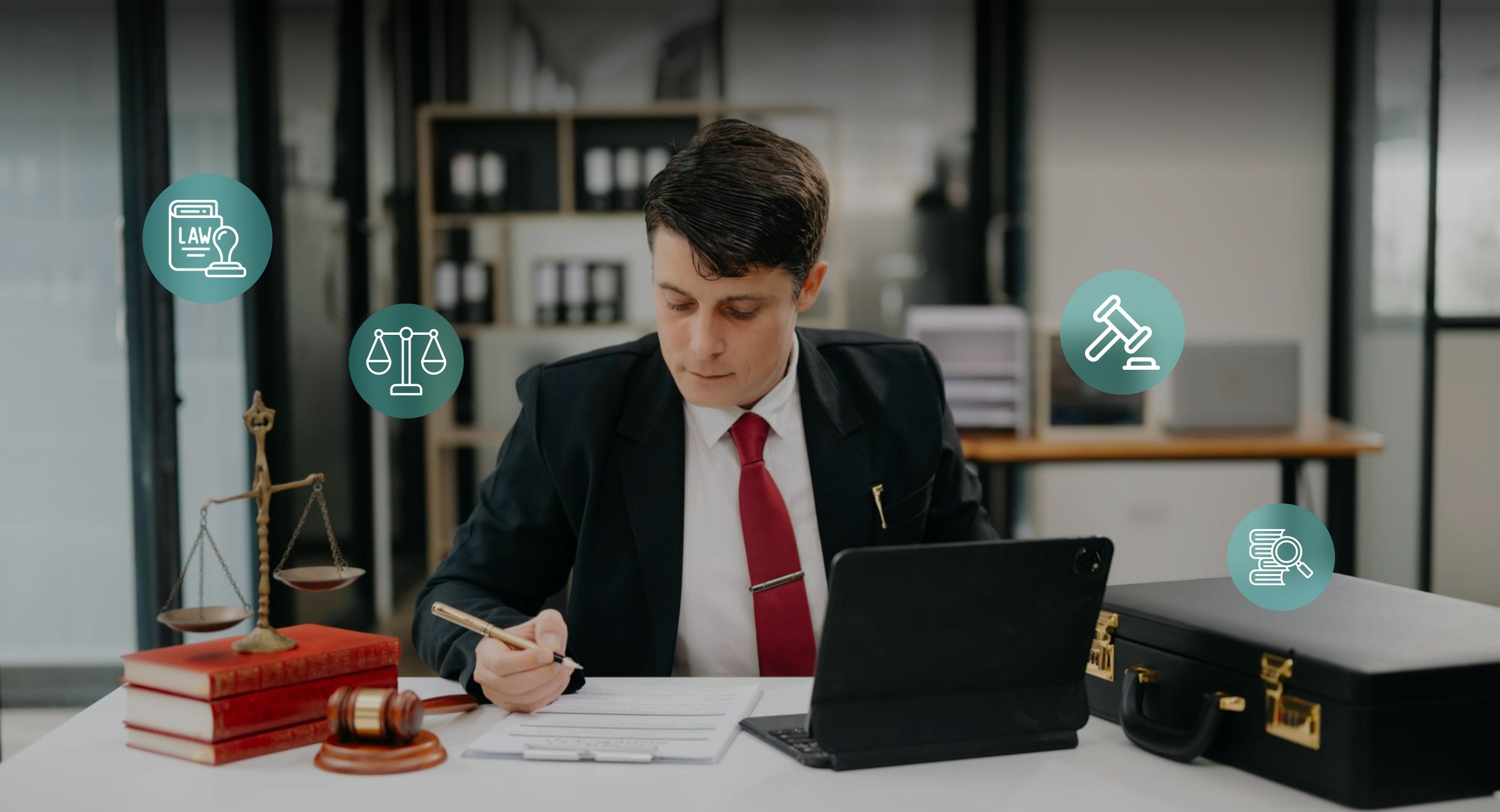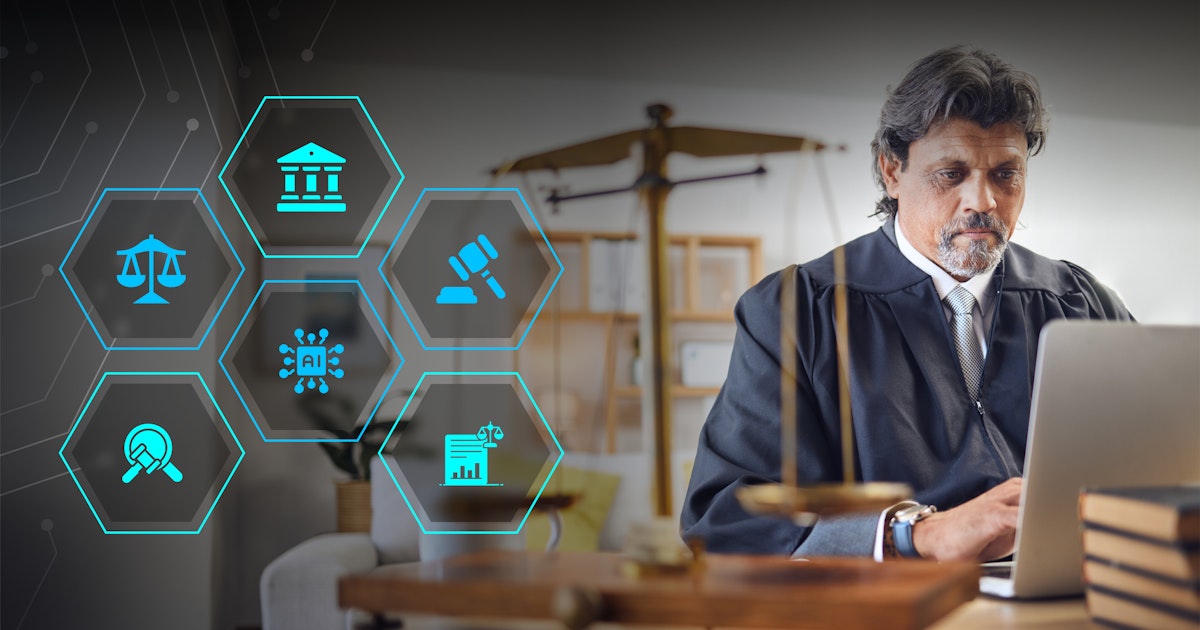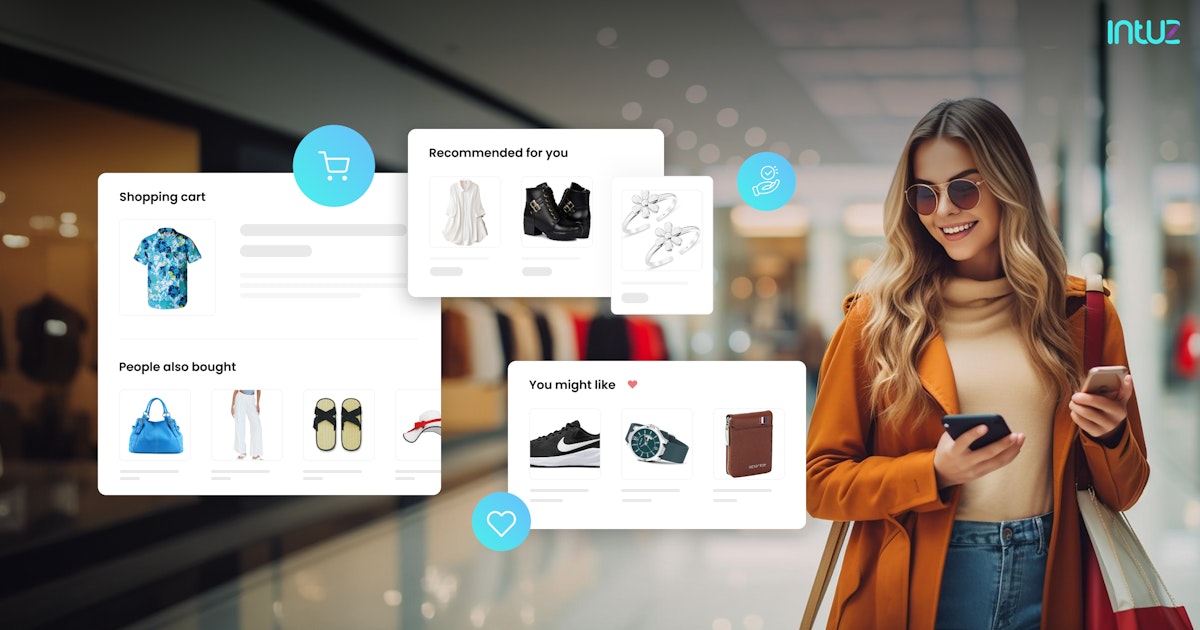Table of Content
A traditional legal research process typically conjures up an image of lawyers, paralegals, and associates spending countless hours delving into case files, law journals, and statutes to build their arguments.
This conventional approach, however, isn’t free from limitations in the legal industry. It’s time-consuming, inefficient, and prone to human error.
In fact, would you believe it if you found that 75% of lawyers spend 20 hours or more per week on non-client-facing billable work such as legal research, court filings, and administrative routine tasks?
Research, especially, can be prohibitively expensive, as access to premier legal databases comes with a steep subscription fee.
Generative AI is attempting to revolutionize legal services
Generative AI in legal industry, powered by Natural Language Processing (NLP), can parse through vast amounts of legal texts at speeds no human can match. It can summarize cases, suggest relevant precedents, and even predict case outcomes with a significant degree of accuracy.
Lawyers are optimistic that Generative AI tools will help handle mountains of paperwork, which previously required a dedicated legal support staff to review each page.
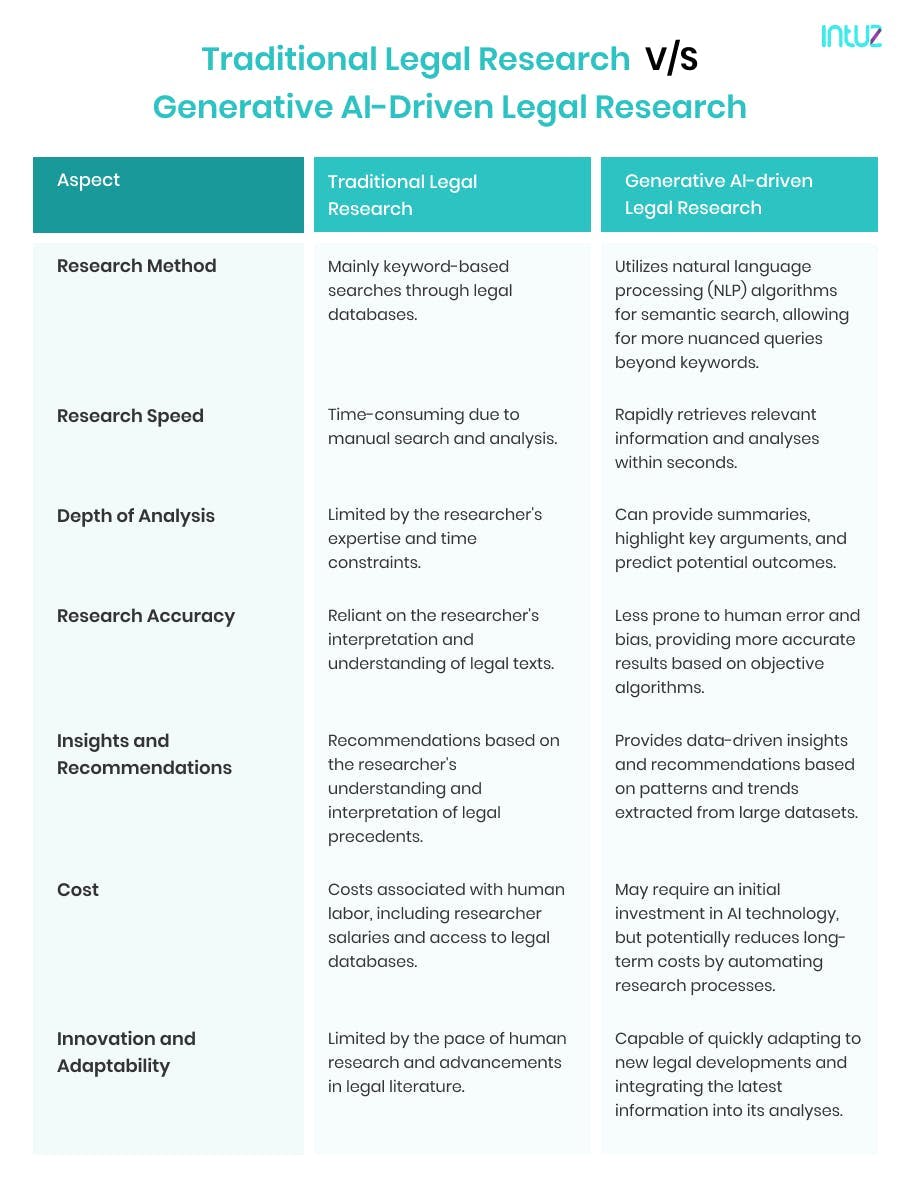
Key takeaways
Sift through extensive legal texts to highlight crucial clauses, risks, obligations, and potential compliance issues with Generative AI, significantly aiding in due diligence and time savings.
Boost efficiency in legal document writing with appropriate language and formatting support, AI templates, and auto-fill features.
Accurately translate legal documents and research materials, eradicating language barriers and facilitating international legal operations and transactions.
Streamline the IP research and analysis framework with AI-powered predictive insights for instant trademark reports and an easy patent search process.
Uncover emerging trends, potential future rulings, and legal risk areas; make better legal decisions with Generative AI-powered predictive analysis.
How Generative AI is revolutionizing legal research capabilities
Every lawyer has a unique method of conducting legal research and objectives. Generative AI helps customize research strategies for different strengths, skills, and interests. Let’s look at how it influences legal research methods and what types of potential case outcomes it delivers:
1. Enhanced due diligence via document analysis, summarization, and compliance checks
Since Generative AI operates using complex algorithms trained on extensive legal databases, it can conduct contract reviews and compliance checks quickly and accurately, comprehending and recognizing key sections that need urgent attention by lawyers.
For example, in contract analysis, the technology can go through volumes of documents to identify critical indemnity, liability, and confidentiality clauses, pinpoint obligations, and highlight elements that may pose potential legal issues.
There are also advantages to consider when it comes to compliance checks. For instance, if your client operates in a highly regulated financial services sector, an AI system can scan customer/vendor contracts, service agreements, and internal policies.
This ensures these important documents comply with anti-money laundering (AML) laws and consumer protection and privacy regulations, such as GDPR or HIPAA.
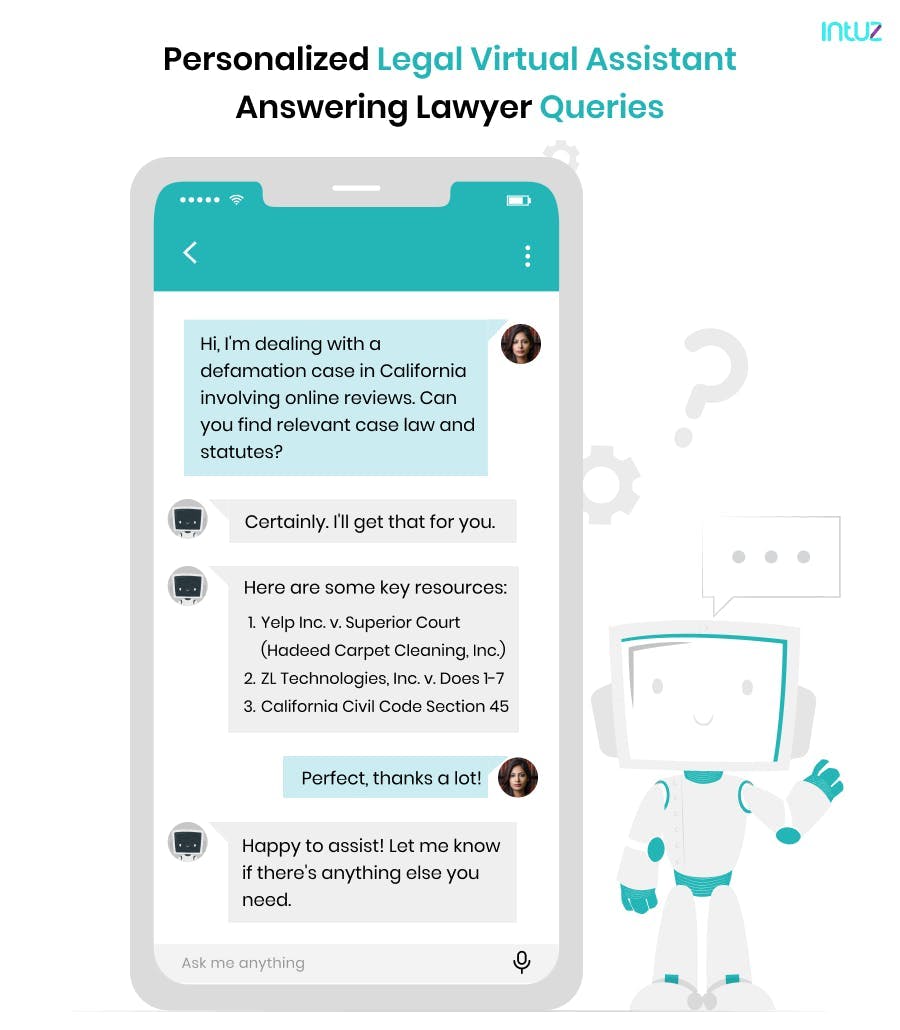
2. Boost efficiency with faster legal document writing
Generative AI legal assistants can understand context, legal terminology, and the nuanced semantics ingrained in legal discourse. This capability enables it to propose relevant language and clauses while creating new documents tailored to the unique demands of a given case or transaction.
For example, in the case of a merger between two tech companies, the technology can make text suggestions that address Intellectual Property (IP) rights, employee confidentiality agreements, and regulatory compliance.
It ensures that the proposed document language aligns with legal standards and best practices while also considering the specific goals and concerns of both parties involved in the merger.
AI templates also serve as customizable blueprints for legal contracts, business proposals, and email responses; these are pre-loaded with content structures and formatting styles to pick and choose from.
When you initiate a document creation, the technology analyzes the context or purpose of the document and auto-fills it with appropriate information (e.g., party names, dates, jurisdictional details), drawing from user input, historical data patterns, and legal databases the generative language model was trained on.
This form of automation saves you from manually adding all details in the relevant documents, which, in turn, minimizes the risk of errors and inconsistencies while maintaining a high standard of quality.
3. Multilingual research and translations
Imagine your US-based client plans to acquire a company based in South Korea—where Korean is primarily spoken.
The transaction will require a thorough review, understanding, and integration of contracts, regulatory filings, and corporate documents in English and Korean.
Now, you can set up your legal team fluent in Korean to conduct due diligence. But that would only increase your overhead costs and the time it takes to finish the acquisition formalities.
That’s because legal translation is more than just converting words from one language to another; it involves accurately rendering complex legal concepts and terminologies while preserving their intended meaning.
Generative AI-powered translation tools are helpful as they recognize and correctly interpret the exact meaning of terms that might have different implications in legal matters compared to everyday use in other geographies.
With this generative AI-powered legal technology, you can quickly translate and summarize foreign legal materials, case laws, and regulatory documents and prepare research work accessible to Korean legal practitioners in a language they understand.
Generative AI allows you to smoothen legal frameworks and remove potential regulatory hurdles, which are invaluable when dealing with international law, cross-border disputes, and global compliance issues.
4. Automate trademark and patent research
People file for trademarks to ensure exclusive rights for using specific symbols, logos, or phrases representing their products or services.
Similarly, patents are filed to gain exclusive control over creating, using, selling, and distributing an innovative product or process for a certain period.
Nonetheless, both legal tasks require lawyers to identify relevant trademarks or patents, assess their novelty, and determine potential infringement or violation risks—which boils down to heavy research work.
For example, if a tech startup is developing innovative drone technology, it must first ensure that the technology is patentable and doesn’t infringe on any existing patents.
Traditionally, IP lawyers would have to spend weeks researching thousands of patents to ensure everything was in place. However, Generative AI algorithms can make this task a breeze.
You simply input the drone technology’s technical descriptions and potential applications into an AI-powered patent search tool to receive a report on existing patents, areas of technical overlap in patent documentation, and guidelines for crafting the patent application.
Armed with strategic valuable insights, you can appropriately guide your clients and implement a streamlined and enhanced IP research and analysis mechanism that reduces examination times by up to 50%.
5. Legal strategy building and risk assessment
Every business legal firm wants to give their clients the best possible legal advice. They want to stay ahead of the changes in their industry and be aware of all legal risk areas. Generative AI helps lawyers make informed decisions—minus the risk in all legal practices.
For instance, if your corporate law firm advises businesses on employment law matters, you can analyze data from past employment discrimination cases using legal AI-driven tools and recognize trends and factors that commonly lead to favorable or unfavorable outcomes for employers.
The AI technology might reveal that cases involving thorough documentation of employee performance issues are more likely to result in favorable outcomes for your client. However, a lack of documentation against an employee can lead to higher compensation.
Whatever the legal outcomes, you can use these insights to assess the strength of the client’s case and advise on the best course of action, whether preparing for legal proceedings (e.g., trial) or seeking an early settlement.
If you go ahead with a trial, AI can help determine the most compelling arguments to present and identify the precedents most likely to influence the judge or jury, thus solidifying your litigation strategy.
Additionally, Generative AI’s predictive insights can be invaluable in settlement negotiations. With robust legal insights in hand, you can negotiate more confidently in the relevant case law, advocating for settlement terms that reflect the predicted verdict should the case go to trial.
Upscale Your Legal Practice with Generative AI: Start Now with These 5 Use Cases
Read nowEmbracing a positive sentiment towards Generative AI legal research products
A LexisNexis research states that 65% of legal departments see the potential for Generative AI in researching matters, and 47% believe this technology will give law practice a much-needed facelift, ending in potential outcomes.
It presents a greater opportunity for lawyers to focus on analysis, reasoning, and creativity without worrying about taking on the workload of repetitive tasks.
Obviously, this new perception underscores the need for trusted providers of Generative AI-powered legal research platforms in the legal field.
You must leverage a personalized Generative AI app strategy tailored to your legal firm to optimize your legal research and boost your efficiency.
Don’t worry—we’re experts in Generative AI app development and can offer consultation that addresses your queries. You’ll also get free actionable strategies or a roadmap for implementing this technology in your operations.
What are you waiting for?
